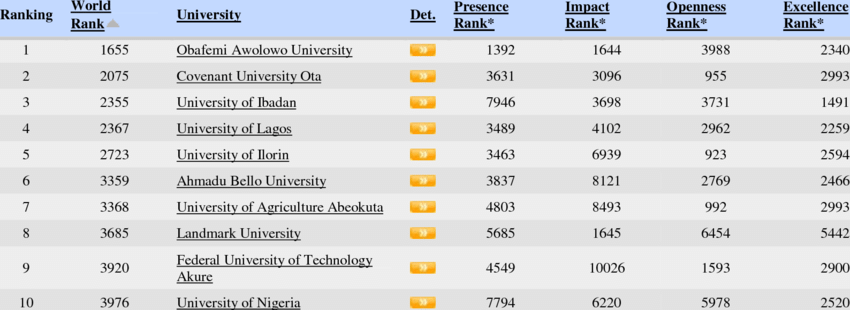The 2011 ranking of the top 100 African universities was recently posted on the internet. From a Nigerian perspective, it made very sad reading to note the low ranking of our universities. According to the posting, University of Ibadan, at number 32, is the highest ranked Nigerian university, amongst the top 100 on the African continent. It was followed by the University of Ilorin, at number 34.The next was the University of Benin at number 40; Obafemi Awolowo University, Ile Ife at 44, while Ahmadu Bello University came in at number 62 and the last Nigerian university ranked among Africa’s top 100, was the University of Jos, at number 70.
As has become the norm, the leading African universities are located in South Africa, with the University of Cape Town ranked as the highest ranked in Africa, with the universities of Pretoria, Stellenbosch, Witwatersrand, Kwazulu-Natal and the University of South Africa and the University of the Western Cape being amongst the top ten, joined by the University of Cairo as number two, while the American University in Cairo and the Mansoura University, also in Cairo, were named as the best ten on the African continent. It is remarkable that the University of Mogadishu, in war-torn Somalia, which has not had a government of any meaning in nearly two decades, was ranked ahead of all Nigerian universities, as Africa’s 29th, ahead of Nigeria’s pioneer university, Ibadan.
For long we have lamented the sharp decline in the Nigerian educational system in general, but of the tertiary level in particular. The problem can be traced to the mid-1980s, when the military dictatorship of Babangida, launched a purge of the Nigerian university system, which were a locus of opposition to the Structural Adjustment Policies of the regime. The regime vowed to stop intellectuals who taught radical ideas they were not paid for, and before long, the best intellectuals left the authoritarian environments within the university system in droves. While the academic staff union continued to lead a valiant struggle to uphold basic standards in the universities, a new reality had crept in. Faculties became arenas of factional struggles between religious and ethnic factions, while the facilities were over-stretched, with more students getting admitted beyond the capacity of the system to cope. Our students, cultured within the violence of military dictatorship, began to participate in violent cult activities in many universities, while the student union movement lost its idealism and became appendage organizations of political groupings, often outside of the campuses.
Twelve years down the democratic path, there has not been a well-thought out policy to regain the position of the Nigerian university system as centres of learning and research, at a level which can impact decisively on the national development process. Almost every day, private universities are licensed and most are tied to religious denominations, without a corresponding increase in the stock of qualified lecturers. This has led to the same set of lecturers going around the country to teach in the poorly thought-out, but very expensive private universities. We seem to be running in circles, while government throws money at the problem, without getting to the root of the crisis. But as the failure rate in qualification examinations have shown, over the past four years, the situation might get worse for the Nigerian university system. It is shameful that our universities are so badly-ranked on the African university ranking list, but it offers an opportunity for Nigerians to debate the serious decline of our educational system in general and tertiary education in particular, so that we can find the scientific resolution for the problem. The university is the bedrock of national development and must never be toyed with.


